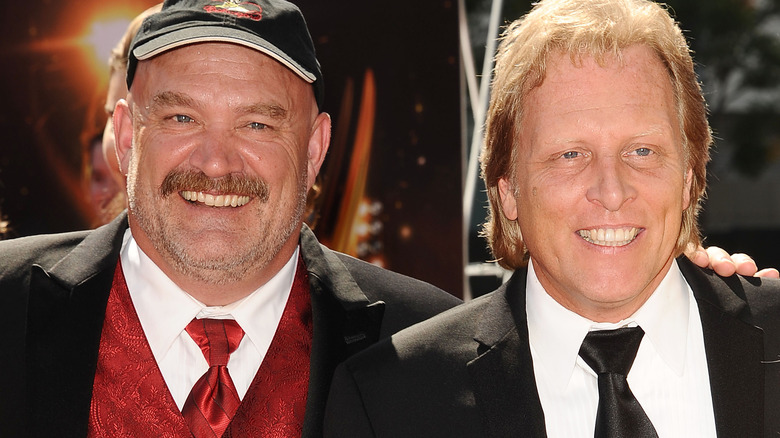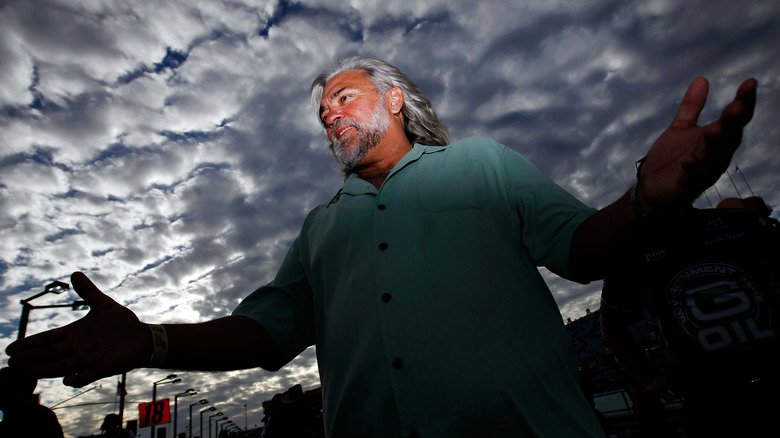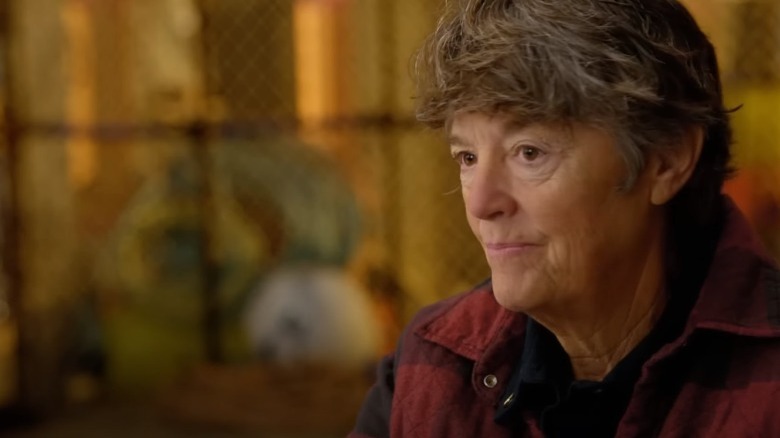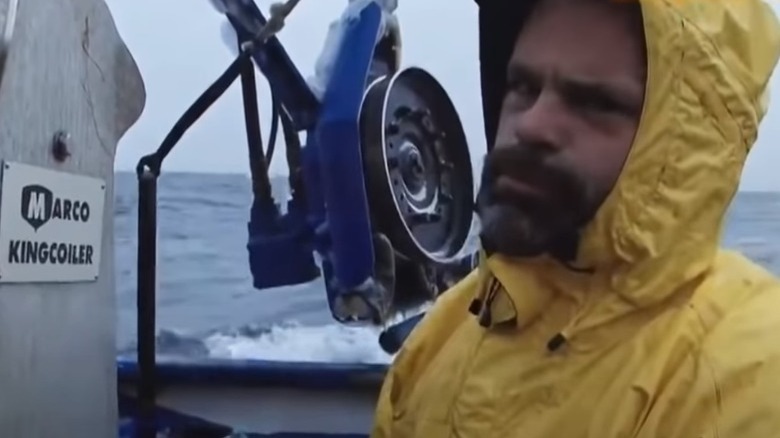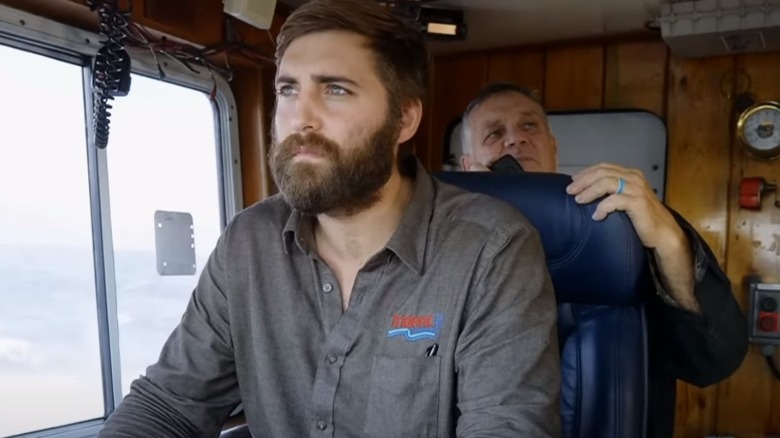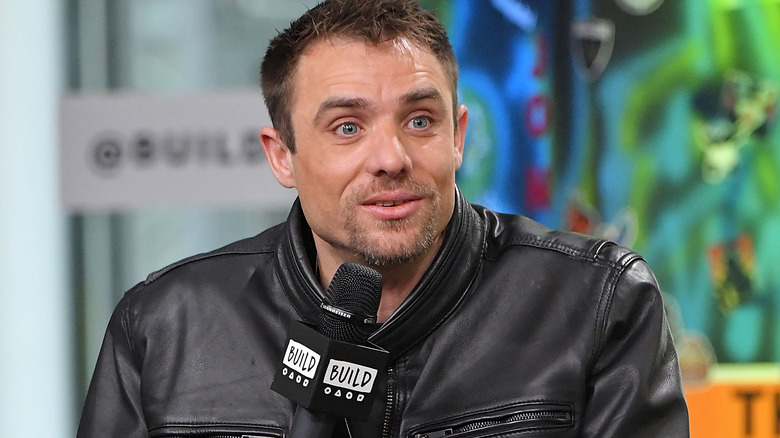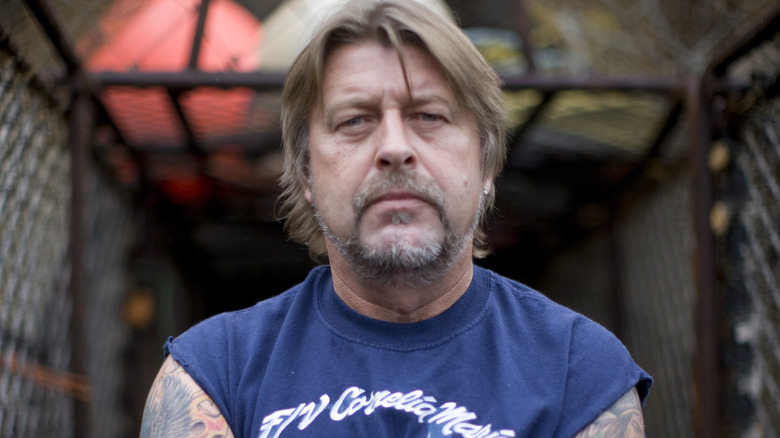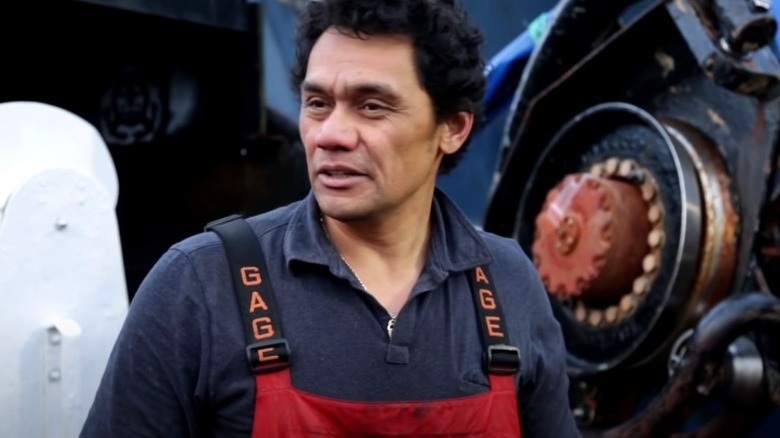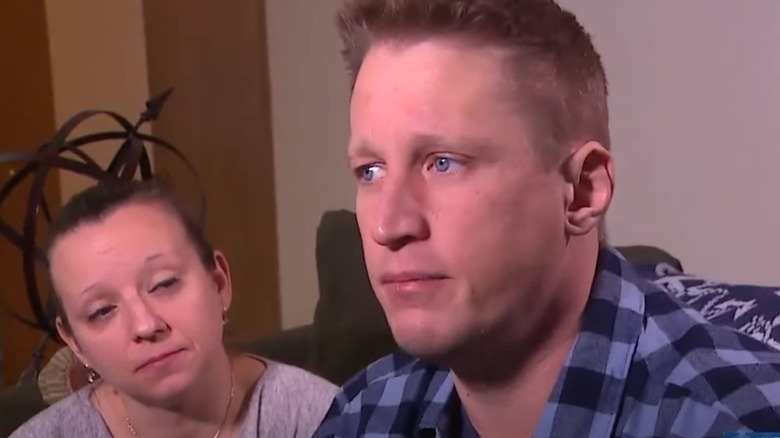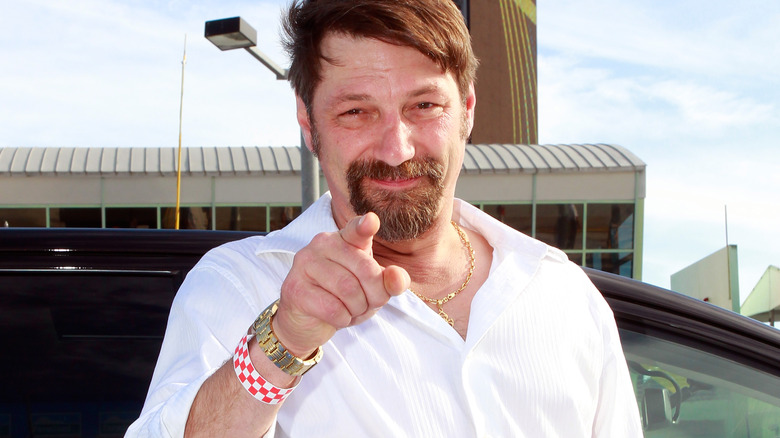11 Toughest Cast Members From Deadliest Catch
First things first: Everyone who appears as a cast member on "Deadliest Catch" is legit, because the commercial fishing industry is one of the most dangerous jobs out there. Not only are there a surprising number of ways fishermen can get injured or die, but they're pretty horrible ways to go, too. Making sure that doesn't happen — to anyone on the crew — takes some serious strength, stamina, situational awareness, and the ability to go long hours without sleep or food, all while staying on top of what's going on ... and what can potentially happen in a split second.
It's easy to fall into the trap of beginning to think that just because "Deadliest Catch" is on television, there's no way that the producers or the network could possibly let anything happen, but here's the thing: The Bering Sea doesn't really care who's watching, and one slip-up can mean the end of a life. Those who go out, do so prepared to face the worst.
That said, not all crew members are made of the same stuff. There are some that have been forged in fire, come out the other side, and then gone on to spend months at a time in one of the most unforgiving landscapes in the modern world. That takes a kind of toughness that can't be measured ... and it's one that's not always about who can bench-press the most.
Captain Wild Bill Wichrowski
For some, childhood might be a time of innocence. For Captain "Wild" Bill Wichrowski, that wasn't entirely the case — and he told We Are The Mighty that it was his upbringing that not only got him where he is on "Deadliest Catch," but made him successful. The Pennsylvania-born captain was the son of a Korean War-era drill instructor: "I probably didn't really like [my father] much at the time, but he was training me to be a leader from Day One. In his eyes, there was only one place to be, and that was in charge." Wichrowski enlisted in the Navy, and never left working on the waters.
That's included fishing in Costa Rica and in other areas around the world: When TV Show Ace asked him about his biggest catch, it had nothing to do with "Deadliest Catch. Wichrowski said that he was out on the waters in Panama when — even as a thunderstorm moved through — he found himself fighting to reel in a 500-pound marlin. The boat began to flood, and he wondered if that would be the end of it all.
Wichrowski does have some criticism for "Deadliest Catch," telling Hook & Barrel. "One thing the show does is it makes everyone sitting on their couch think they're a crab fisherman. Everybody says, 'Oh, I can do that.'" And that's absolutely not the case: He describes a day as having 32 hours, and their time on the water as an endurance test.
Linda Greenlaw
In 2023, "Deadliest Catch" added another captain to their roster, and this one was Linda Greenlaw. Greenlaw was a new face on the show, but she wasn't a new face to those in the know. She is the U.S.'s only female swordboat captain, and the captain described in "The Perfect Storm." It was Greenlaw who was at the helm of the Hannah Boden, who last made contact with the Andrea Gail before she sank in a rare, once-in-a-lifetime storm that — after sinking the Andrea Gail — headed right for Greenlaw's position.
She told CNN that by the time the storm hit her, it wasn't quite as powerful. She added, "I like to think that there is something that separates those who survive from those who do not, something other than luck. If I believed that luck had a hand in my survival, I would also have to believe that eventually, my luck would run out."
Now, what exactly does being a swordboat captain entail? As Greenlaw explained to NPR, she started fishing seriously when she was 19, and swordfishing is grueling work. Her boat first sets a line that's 40 miles long and baited with around 1,000 hooks. Then, the next day, they pull the line back in, along with whatever has been caught. And unlike the Bering Sea crab boats, the captain is on the deck with the rest of the crew, hauling in swordfish, sharks, tuna ... some of the biggest fish out there. "Tough" doesn't even begin to cover it.
Matt Bradley
Calling someone "tough" isn't always a reflection on how much they can lift, or the punches they can throw, but it's about what they've struggled with and overcome. And for that? They don't get tougher than Northwestern crew mainstay Matt Bradley. When Bradley spoke with Windward Way Recovery founder Jeremy Broderick (via the Huffington Post), he was candid about what his life had been like for a long time. After his time on the boat — and on "Deadliest Catch" — he'd head to land and fall back into the old routines of buying and using not only cocaine but heroin and crack as well.
Drug abuse and addiction is a massive problem in the commercial fishing industry: Research published in the International Journal of Environmental Research and Public Health suggests that many fishermen get hooked on opioids first prescribed for pain management. Bradley says that he's seen it firsthand, suggesting that as many as 90% of the people he'd worked with have had some kind of substance abuse issue.
In an interview with Business Innovators Radio Network, Bradley explained that he was on the boat when he decided that he had to make a change. While he was sharing stories of high-speed chases and random women, others were sharing photos of their families and children. "I thought I was having fun, and then one day, I woke up and was like, 'You know, this is crazy.'" So, he checked into rehab, got sober, and went on to become an advocate for others. And that? That's toughness.
If you or anyone you know needs help with addiction issues, help is available. Visit the Substance Abuse and Mental Health Services Administration website or contact SAMHSA's National Helpline at 1-800-662-HELP (4357).
Jack Bunnell
Jack Bunnell joined "Deadliest Catch" for Season 19, when he was at the helm of the F/V Barbara J. Interestingly, it wasn't the first time he'd been on the show, as it were: He worked a short stint on the Saga before being fired when he made it clear that he firmly believed safety should come before footage. Bunnell was a crew member at the time, but felt decisions were being made that put television before safety, and he called his captain out on it. (The official statement from Discovery and "Deadliest Catch" producers issued through The Seattle Times said safety always came first.)
Bunnell did something that's yet another version of the idea of "tough": He saw something he felt was wrong, stood up to the captain, and put his job on the line for it... and, there was an accident. Bunnell voiced worries about how the crab pots were being stacked — in a way that they could potentially catch more waves — and when one of those pots broke loose, it caught Bunnell in the leg. Also televised? Bunnell getting fired for going for a drink when they came into port.
Still, an injury and a confrontation with a captain definitely didn't deter Bunnell. The Alaska native and third-generation crab fisherman had made his ambitions clear to The Seattle Times: "In the future, I'd like to be in the wheelhouse. That's where I have my goal set." And in season 19, his hard work paid off.
Jake Anderson
Physical toughness is one thing, but emotional toughness? That's something else entirely, and "Deadliest Catch" Captain Jake Anderson has both. For starters, he's been candid about the struggles in his pre-fishing life: When an injury put an end to what he thought was going to be a career as a professional skateboarder, he found himself homeless, unemployed, and in an ever-worsening addiction to drugs, including meth and Adderall. He recalled in his book, "Relapse" (via Go Skagit): "There was nowhere to go. ... I'd given up on life."
But Anderson picked himself up and found a new career in the commercial fishing industry, going through rehab and getting clean. The world wasn't quite done throwing him some awful stuff, though, and in 2009, he was on the Northwestern when he received word that his sister had been rushed to the hospital, where she passed away after being diagnosed with pneumonia.
Then, the following year, he received word of another family tragedy: His father had disappeared. After failing to return home in January 2010, law enforcement found his truck, his cell phone, and then... nothing, for more than two years. That's when they finally found his remains, with KOMO News reporting that identification was difficult as law enforcement had to rely on cadaver dogs to find the scattered remains. Through it all, Anderson has remained steadfast: He and his wife welcomed their second child, and he climbed through the ranks to become the captain of the Saga.
Sig Hansen
It's not entirely surprising that when it comes to the toughest people featured on "Deadliest Catch," there are quite a few captains to be counted among them, including Sig Hansen of the Northwestern. In 2016, he had an incident that he thought was heartburn. He told People, "It was sharp and radiated from my chest up through my neck. I wanted to take a bunch of Advil and Tums and make it go away and lie down. Had I gone to sleep, I'd probably be dead."
When his fishing boat crew and the film crew convinced him that he should probably get checked out, he was told that he had suffered a type of heart attack doctors called a widowmaker. It was enough that he overhauled a lot of his life — like his diet and exercise — but he had another heart attack three years later.
This one, he told Entertainment Weekly, happened after he had a severe allergic reaction while driving. He drove right to the hospital, and when they administered the EpiPen, it triggered another heart attack. Hansen was honest, saying that yes, he likely would have died if it had happened on the ship, and continued: "I'm still afraid to go on the boat. I don't like it anymore. ... I'm still trying to get over this [heart attack]. It's been really hard. I don't know how much more I've got left in me." Plenty, as it turns out, because he was, of course, soon back fishing and back with the "Deadliest Catch" franchise.
Phil Harris
When Cornelia Marie Captain Phil Harris died in 2010, it was shocking news: Fans saw him weather some incredible injuries, and if anyone seemed potentially invincible, it was him. He had, after all, been working in one of the world's most dangerous industries since he was 7 years old.
A few years prior to his death, Harris was interviewed by The Atlanta Journal-Constitution (via The Denver Post). At the time, he was dealing with the still potentially deadly aftermath of broken ribs, a punctured lung, and a blood clot that had nearly killed him. He took it in stride, though, even joking, "You know what the ratings would have been if I had died? Hot diggity dog! He's a dead man!" Fans of the show will recall that when the accident happened, Harris had to be persuaded to seek medical attention — he had been planning on just working through the pain.
He had been doing it for years already, after all, describing the pain in the interview: "Everything in my body aches. It takes me 20 minutes to get out of bed every morning." In addition to the accident featured on the show, there was also a broken back. And still, Harris worked through it all: His son, Josh, told People that when he started the season that would ultimately be his last, he was in constant pain from the four crushed disks in his back. Still: the ocean called.
Freddy Maugatai
Here's the thing about people who are really, truly tough: They don't have to go around telling other people just what kind of person they are and let their actions speak for themselves. Freddy Maugatai was a fan favorite on the Cornelia Marie before swapping over to the Wizard, and he was a favorite because he seemed to embody the sort of every-man attitude... albeit with a little more "bathing in cod blood" than most people see in a lifetime. Still, there's one incident that shows just how unflinching he is in the face of the freezing weather of the Bering Sea... and yes, it's that moment.
Crab isn't the only high-priced bounty of the sea, so when the crew saw a dead walrus floating in the freezing waters, they knew they could pull it on board, harvest the tusks, and make thousands of dollars. How many thousands? Lots: According to Classroom, at around the same time this one was spotted, a single, legally-sold tusk could be worth as much as $50k. When more conventional methods failed to hook the walrus, Maugatai decided the best thing to do was what Captain Keith Colburn arguably thought was the worst: He jumped overboard.
The crew went into immediate rescue mode — especially considering Maugatai didn't even bother with a survival suit. Hypothermia can set in very, very quickly, and falling overboard is one of the leading causes of death in commercial fishing. Fortunately, he was rescued and didn't become one of the statistics.
Keith Colburn
Part of the benefits of being the boss is delegating tasks to other people, so when the captain dons a wetsuit and gets into the water to carry out a hull repair himself, that says a lot — particularly when it becomes very, very clear just how dangerous of a job it is: when a rogue wave rocked the boat, it came down squarely on the captain's skull.
Just another day at work for Captain Keith Colburn, the Bering Sea captain who has worked through some ridiculously painful conditions. Colburn was forced to miss the 2018 season while undergoing treatment for a condition called osteomyelitis. What is that? According to the Mayo Clinic, it's an incredibly painful infection in bones, one that typically requires surgery and intravenous antibiotics to fix. Colburn's was in his back, and if it sounds like that was about the time to retire, he didn't.
Just two years later, Colburn once again found himself suffering. This time, it was an umbilical hernia, which the Mayo Clinic says is a condition where the intestines push their way through the abdominal muscles. The pain — and the potential for serious complications — sent Colburn back to land and the hospital. It wasn't long afterward that he was diagnosed with a severe case of COVID that necessitated the use of oxygen. He told Nicki Swift that his health — coupled with the increasing difficulties presented by climate change — might just be enough to have him thinking of retirement.
Dean Gribble, Jr.
Dean Gribble, Jr. might not be as familiar to "Deadliest Catch" fans as some of the regulars, but the events that transpired a few years after his 2017-2018 stint on the show bear talking about. When the Scandies Rose sank, it was an eye-opening and heartbreaking reminder of just how unforgiving the Bering Sea could be. In a heartbeat, five crew members vanished into the stormy waters, while Gribble and fellow crew member John Lawler were rescued.
Gribble shared the terrifying experience with Alaska Public Media, saying that it was Lawler who woke him up. He had only minutes to try to distribute survival suits, get into his own, and get clear of the rapidly sinking ship. "I knew I was going to die. My main concern was just trying to get out so maybe they could get my body or something, for my family to get closure."
Gribble says that he and Lawler jumped — into the darkness, into freezing waters, into 40-foot waves. There was a life raft a few hundred feet away, and swimming to it was only the first part: Then, it was a long, four-hour wait for rescuers. Gribble and Lawler later testified (via Alaska's News Source) that they hadn't seen anyone else leave the ship. It wasn't until a year and a half later that the National Transportation Safety Board released their findings that the stability instructions for the ship had been dangerously inaccurate, and contributed to the ship's capsizing.
Johnathan Hillstrand
Johnathan Hillstrand and the Time Bandit were fan favorites, so when Hillstrand came out of retirement and returned to the Saga, it was a little weird. He explained to Stuff that it was just a matter of money, saying that there was no point in spending the shocking amount of money to get the Time Bandit crewed and on the water when he could just take his captain's quota to another boat. So, he opted to join Jake Anderson's crew, and that's kind of fitting: Both have continued to go out season after season, while weathering some devastating losses.
In 2013, Hillstrand and Seabrooke captain Scott Campbell Jr. spoke with Yahoo TV about just how dangerous their jobs really were, and Hillstrand mentioned the fact that the worst injury he'd ever seen on deck was a severed leg. Worse than that, though, were the dead men: "I've pulled... four dead guys out of the water, and I've saved five." Also mourned? Hillstrand's friend, Gary Cobban Jr. and his son, Dave — they died in the sinking of the Scandies Rose.
He's also said goodbye to Mike McCollum, who wasn't just the Time Bandit's engineer, but Hillstrand's closest and oldest friend. It's up to Hillstrand and McCollum's son, Jesse — a deckhand on the Time Bandit — to spread the ashes, and Hillstrand admitted that he had been putting it off because he dreaded the goodbye. And saying goodbye, to so many, so often? That's the definition of tough.
